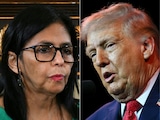- Japanese PM Shigeru Ishiba vows to remain after upper house election defeat
- Ruling coalition fell short of majority with 47 of 50 needed upper house seats
- Opposition may submit no-confidence motion against Ishiba's administration
Japanese premier Shigeru Ishiba vowed to stay on after his ruling coalition suffered a bruising defeat in upper house elections on Sunday as some of his own party discussed his future and the opposition weighed a no-confidence motion.
In a series of televised remarks as the results came in on Sunday evening, Ishiba told reporters he would remain as prime minister, citing a looming tariff deadline with the United States set to strain the world's fourth largest economy.
Ishiba is due to hold a press conference at 2:00 pm (0500 GMT) where he will formally announce those plans, broadcaster NHK reported.
Analysts say his days may be numbered, having also lost control of the more powerful lower house in elections last year and shedding votes on Sunday to opposition parties pledging to cut taxes and tighten immigration policies.
"The political situation has become fluid and could lead to a leadership change or the reshuffling of the coalition in coming months, but Prime Minister Shigeru Ishiba will likely stay to complete the tariff negotiations with the US for now," said Oxford Economics' lead Japan economist Norihiro Yamaguchi.
Facing a voter backlash over rising consumer prices, investors fear his administration will now be more beholden to opposition parties advocating for tax cuts and welfare spending that the world's most indebted country can ill afford.
Markets in Japan were closed for a holiday on Monday, although the yen strengthened and Nikkei futures rose slightly, as the election results appeared to be priced in.
Yields on Japanese government bonds sold off sharply ahead of the ballot as polls showed the ruling coalition - which had been calling for fiscal restraint - was likely to lose its majority in the upper house.
Adding to the economic anxiety, Ishiba's lack of progress in averting tariffs set to be imposed by its biggest trading partner, the United States, on August 1 appears to have frustrated some voters.
"Had the ruling party resolved even one of these issues, it (their approval rate) would have gone up, but we didn't feel anything and it seems like the U.S. would continue to push us around," Hideaki Matsuda, a 60-year-old company manager, said outside Tokyo's bustling Shinjuku station on Monday morning.
Populist politics
Ishiba's Liberal Democratic Party (LDP), which has ruled Japan for most of its post-war history, and coalition partner Komeito returned 47 seats, short of the 50 seats it needed to ensure a majority in the 248-seat upper chamber in an election where half the seats were up for grabs.
The leader of the main opposition Constitutional Democratic Party (CDPJ), Yoshihiko Noda, said on Sunday he is considering submitting a vote of non-confidence in the Ishiba administration as the result showed it did not have voters' trust.
The CDPJ returned 22 seats in the ballot, finishing second.
Some senior LDP lawmakers were also quietly voicing doubts over whether Ishiba should stay, according to local media reports on Monday.
Among them was former prime minister Taro Aso, leader of a powerful faction within the ruling party, who said he "couldn't accept" Ishiba staying on, Japan's TV Asahi reported. Senior party members including Aso met on Sunday evening to discuss whether Ishiba should resign, Sankei newspaper reported.
The far-right Sanseito party clocked the biggest gains of the night, adding 14 seats to one elected previously.
Launched on YouTube during the pandemic by spreading conspiracy theories about vaccinations and a cabal of global elites, the party found wider appeal with its 'Japanese First' campaign and warnings about a "silent invasion" of foreigners.
Dragging once-fringe rhetoric into the mainstream, its success could mark the arrival of populist politics in Japan, which until now has failed to take root as it has in the United States and western Europe.
Sanseito's party leader Sohei Kamiya, a former supermarket manager and English teacher, has previously pointed to Germany's AfD and Reform UK as a possible blueprint for future success.
(Except for the headline, this story has not been edited by NDTV staff and is published from a syndicated feed.)















